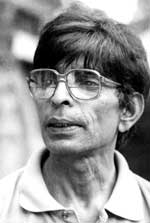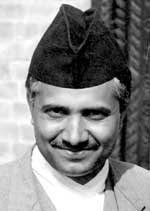Leftist activist and and former minister
It (the appointment) was an unconstitutional step. Being king does not give you the latitude to do anything. If you do that, you are not listening to the voice of the people, their aspirations. This may be detrimental to the nation. The king did not make the announcement earlier because he realised it would provoke strong reactions. The one-year mourning period has not even elapsed yet, and they have done this. This is against the very fundamentals of Hinduism. It goes to prove that the monarchy uses the shield of religion and tradition only when it suits them. Such an unpopular move will be detrimental to the monarchy.
The people have been very vocal in protesting Paras' behaviour. A certain section of students had collected 600,000 signatures to that effect and presented the petition to the late king. The people are not yet convinced that Paras was innocent in that incident.
If you turn the pages of history, you will find that kings used to be elected in this country. It was only much later that the monarchy became hereditary, when Anshuverma became king during the Lichhavi period. After him the monarchy changed hands a couple of times. During the Malla era, even women were crowned rulers. The father of King Jaishtiti Malla, the most powerful Malla monarch, was not even made king. Even in the Shah dynasty, Rana Bahadur did not make his oldest son king, he made him a chautariya. He instead crowned his 18-month-old son, whose mother was a Brahmin widow.
 Khagendra Sangraula,
Khagendra Sangraula, Leftist writer
Paras has been involved in two incidents of murder and countless others of hooliganism and mayhem. The crown prince is the future king of this country and he represents the nation. He stands for all that the nation is worth-its prestige, its reputation. It is natural that people raise questions when someone like Paras is placed in that position. The role of the major parties of the country, the Nepali Congress and the Communist Party (UML), is very important. Intellectuals have always held that the character of future kings must be monitored carefully. But neither the Congress nor the UML took this seriously.
The constitution has given the king the power to nominate the crown prince. It is up to him, who he wants to nominate, why he wants to do so, and when. The king is empowered to do this by the constitution regardless of the character of the eldest son. But the crown prince is the future king, and while making the nomination, the king needs to keep this in mind. The Congress and UML should also have thought about this. There is a major problem in the constitution, and this situation is a result of that.
Shyam Shrestha
Journalist, coordinator, Samajbadi Andolan (Socialist Movement)
The man who has just been made crown prince, Paras, has caused many deaths. The newspapers have reported extensively on his hooliganism. Only last year, he killed musician Praveen Gurung, and everyone knows about this. People took to the streets at the time and even collected a lot of signatures and presented the petition to the late king, who asked the prime minister to look into the matter.
The crown prince is the future king. It is a serious matter that Paras has been made the future king. If the palace wants to remain a constitutional monarchy, it must be democratic in the way it functions. It must take the aspirations and opinion of the people into account. In a democracy nothing is more important than the voice of the people, and their opinion. The people are paramount. In making this decision, their wishes have been crushed. This is a very undemocratic step.
The constitution is a document of compromise, but it clearly states that sovereignty lies with the people, and the people do not like Paras. It is surprising that he was made crown prince during Dasain, when most people were busy celebrating the festival. He was not made crown prince in June because at that time the protests against him were at their peak. The people are still angry with him. But during festivals few people are in the capital and most are busy. They (the palace) realised that there would be few protests during this period and so decided to take this step. People must raise their voice against this.
The palace has always said that it only moves ahead after taking into account the opinion of the people. The people are against Paras, so this announcement is tantamount to going against the will of the people. This shows that the palace is still neither democratic nor constitutional.
 Narahari Acharya
Narahari Acharya Central Commmittee member, Nepali Congress
According to the Constitution, the announcement of a crown prince is a normal matter. That is not a topic for discussion. The discussion going on right now is the manner in which this announcement was made. The most important thing is that the people have the right to discuss the character and behaviour of the person who sits on the throne. It has become clear after 1 June that changes are necessary in the laws and rules concerning the monarchy and the heir apparent. The issue remains even after the recent proclamation. The timing of the announcement was very surprising. It would have been proper if the king had called for a sitting of parliament and made the announcement there. The people have to be given some reasons, some answers. They have to be assured that what happened in the past will not be repeated.
Padam Khadka
coordinator, Pragatishil Budhijibi Sangathan (the Progressive Intellectuals Group)
The crown prince is not just a person, he is an institution. It should be left to the people to decide what type of institution they want. All that Paras did before he became crown prince has been laid bare before the people. We all know that he killed a taxi driver in Putali Sadak. Everyone knows that he killed musician Praveen Gurung. Everyone knows he held a gun against a police officer in Kupondol. We all know about the incident in Chitwan. He causes trouble almost every day.
How can we make such a person the future king? This goes against the constitution. We thought the present king understood the problem with Paras and so did not make him crown prince (in June). We thought he wasn't made crown prince because he was not king material. This sudden decision has shocked and angered us.
Dr Ram Man Shrestha
Chairman, Nepal Rastriya Budhijibi Parishad (the National Intellectuals Council)
To be proclaimed crown prince according to the constitution is not unusual. After the 1 June incident, no one mentioned the issue of picking a crown prince. Even now I do not think it necessary to go into that discussion. There is enough room for people to raise their voice and be suspicious. But there are other, more important issues to be discussed. To tackle issues concerning the monarchy, it is necessary to bring about major changes in the constitution. What is the point in just raising questions and not bringing about changes in the constitution? There are many constitutional changes that need to be made, and this is just one of them. Everything concerning the monarchy needs to be discussed in detail. We did not do that earlier, and that is why we are in this situation now.
Mangal Siddhi Manandar
MP, UML
The decision is in keeping with the constitution. But the present situation does show that the institution of monarchy should be more transparent and democratic. Questions have been raised concerning this and in this light, the decision is a bit surprising. That is all I want to say.


